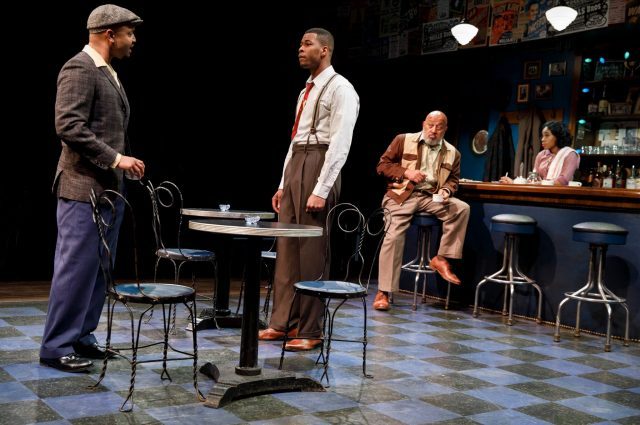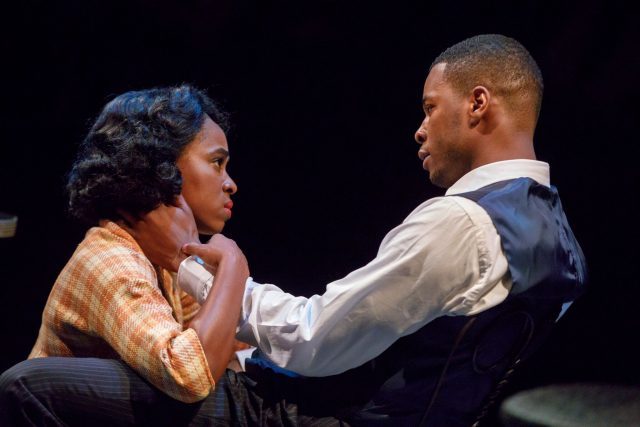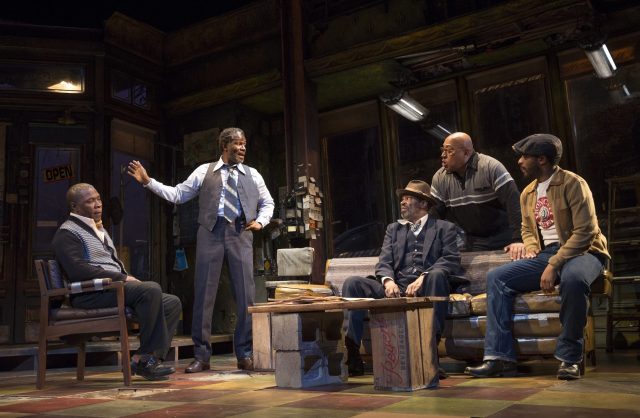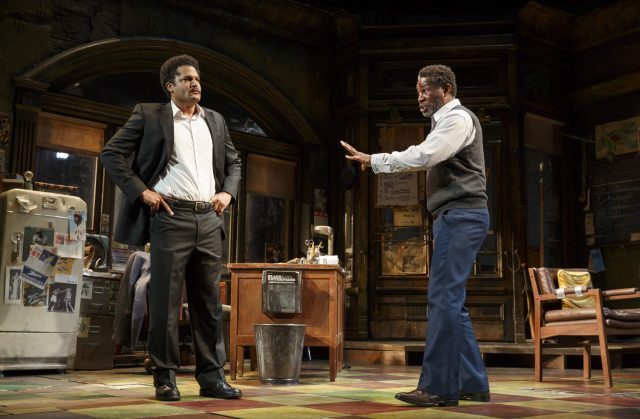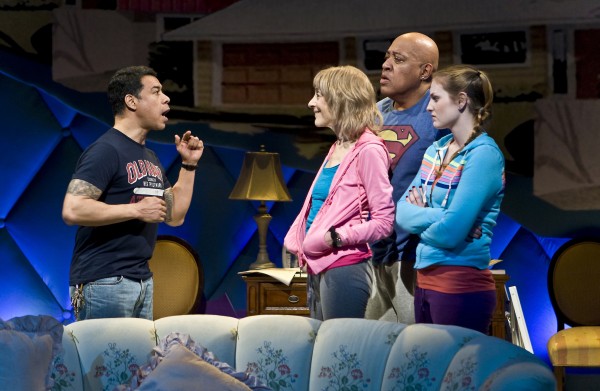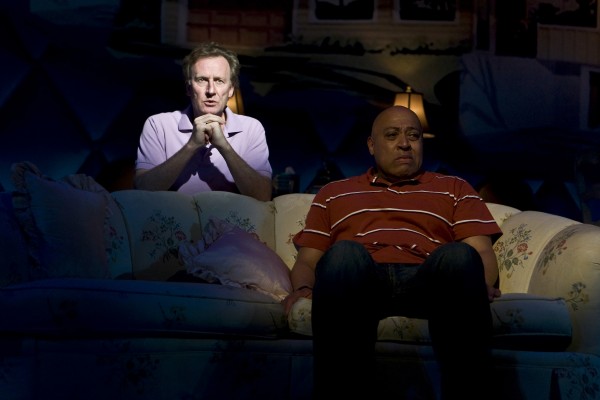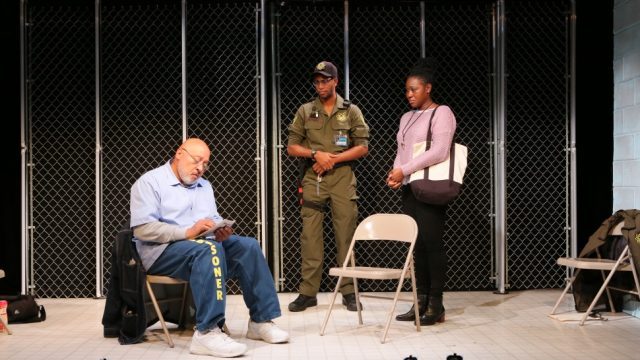
C.O. McHenry (Eric Berryman) and Ernie (Zenzi Williams) wait for Wise (Keith Randolph Smith) in Lockdown (photo by Sandra Coudert)
Rattlestick Playwrights Theater
224 Waverly Pl. between Eleventh & Perry Sts.
Through May 19, $46-$61
866-811-4111
www.rattlestick.org
Cori Thomas’s Lockdown is a social justice story with a critical message that overwhelms the potent drama at its well-meaning heart, resulting in a didactic narrative that feels more educational than entertaining. The plot is torn from the headlines, evoking the current case of Judith Clark, a former Weather Underground activist who was convicted of murder in 1981 for her part in a robbery in which two security guards and two policemen were killed. Clark was sentenced to seventy-five years, but she turned her life around in prison and was released this month for good behavior, against loud and angry opposition. In Lockdown, which continues at Rattlestick through May 19, the longtime prisoner is the fictional James “Hakeem” Jamerson (Keith Randolph Smith), better known as Wise, who has been incarcerated for forty-six years, since the age of sixteen. Young writer Ernie Morris (Zenzi Williams) is volunteering at the prison and has been assigned to Wise, who is making the most of his time, earning a degree and mentoring fellow inmates. “I started a program in here to help the men understand that they don’t need to keep coming in and out and in and out of here. I’m trying to prevent as many as possible from becoming one more black man living they entire life in prison,” he tells Ernie.
Wise and Ernie meet regularly and form a bond, under the watchful eyes of C.O. McHenry (Eric Berryman), who makes sure that they follow the rules, commanding her, “Do not engage in any intimate form of physical contact with any of the inmates. Displays of affection are not allowed! For instance, hugging. Hugging will be cause for immediate termination of your volunteering activities. Overfamiliarity is not permitted. It will not be tolerated!” Meanwhile, Wise is having trouble getting through to young fellow prisoner Clue (Curt Morlaye), a rapper who believes the system is rigged. “Sitting here wishin i could climb this barb wire / Sippin on some pruno, maa-an, that shit is fire! / Scapin’ from living a life of non-sense / Life doing time now add up to no-sense / Doing time has got me feeling age-less / ’Cause in my head it’s all bout bein cage-less / Lil bro say he learnin from big bro / Pointing ya .38 aint the same thing though,” he rails.
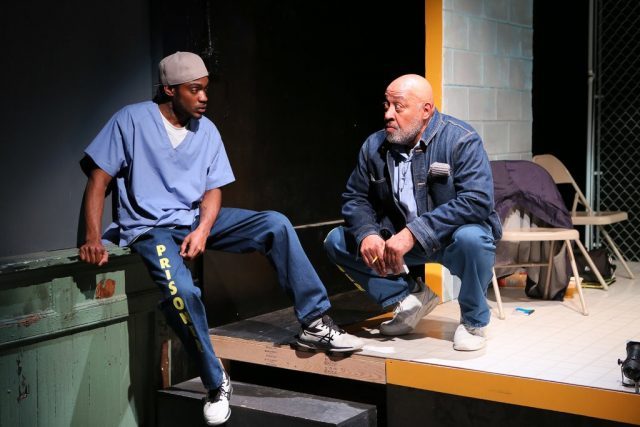
Clue (Curt Morlaye) and Wise (Keith Randolph Smith) deal with life behind bars in world premiere at Rattlestick (photo by Sandra Coudert)
Thomas (Citizens Market, When January Feels Like Summer) and director Kent Gash (Barbecue, Langston in Harlem) wear their hearts on their sleeves as they push humane rehabilitation over inhumane incarceration and questionable parole regulations, never missing a chance to score political points that stop the action in its tracks. “Somebody should expose how unfair the process is,” Wise says about facing the parole board. “Writers always coming in here wanting to write about death row. How come nobody never want to write about somebody like me? I wish people on the outside could see us as individuals, ’cause then they might want to write about us.” Thomas was inspired to write the play after visiting San Quentin for a possible podcast and meeting an inmate named Lonnie Morris, an activist and role model who asked Thomas if she would help him with a play he was writing; Thomas quickly scrapped a play she was working on (about death row) and began Lockdown.
The talented cast of Berryman (The B-Side: Negro Folklore from Texas State Prisons, A Record Album Interpretation), Morlaye (Gotham, Blue Bloods), Smith (Jitney, Paradise Blue), and Williams (Henry V, School Girls; or, the Mean African Girls Play) is hampered by the play’s overstated and repetitive reform agenda. Thomas did extensive research in prisons, running all the scenes past incarcerated men and corrections officers, and it feels that way, as if any tension is a means to an end as opposed to an evolving, involving story as characters preach to the converted on Jason Sherwood’s effective, caged-in set. The message is also sent in the opening music, San Quentin inmate David Jassy’s “Freedom.” Each performance is followed by a community talkback, and the production has partnered with such organizations as Drama Club, the Fortune Society, NYC Together, Pen America, Project Liberation, and RTA (Rehabilitation Through the Arts). Lockdown has a lot of important things to say about how the system treats prisoners, particularly men of color, but it includes too many teaching moments instead of trusting the audience to get the point in a less dogmatic way.
